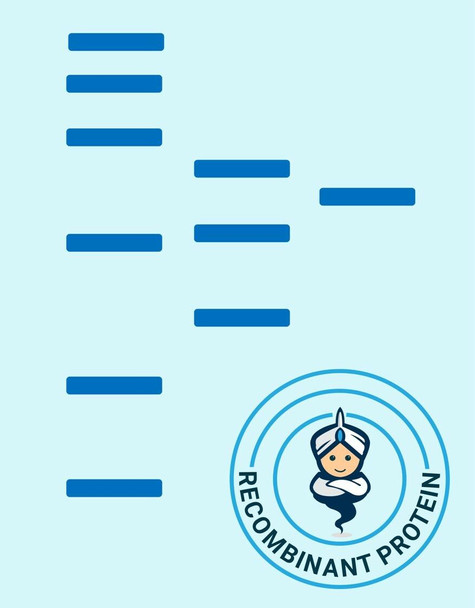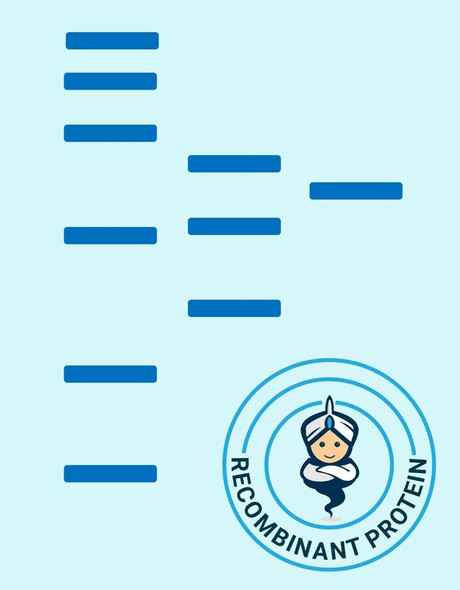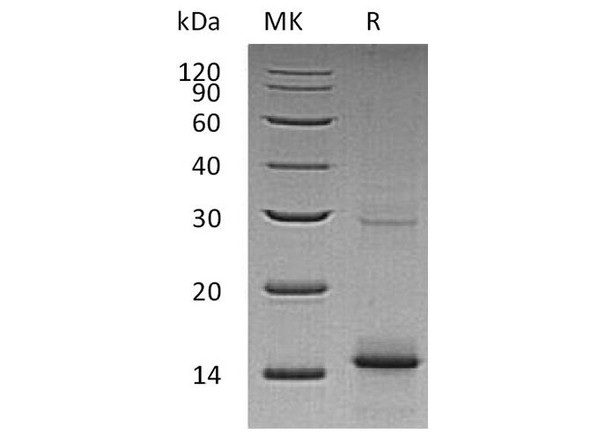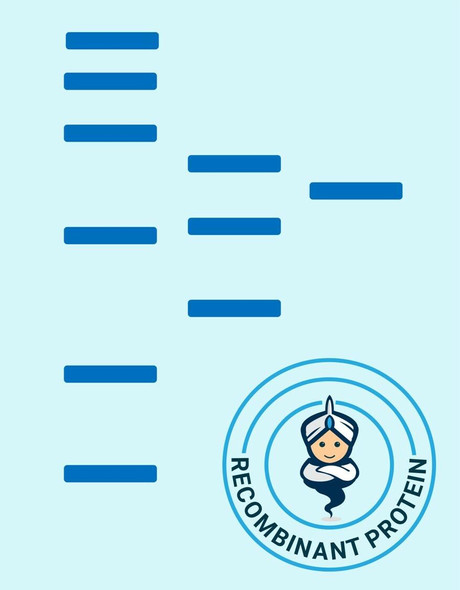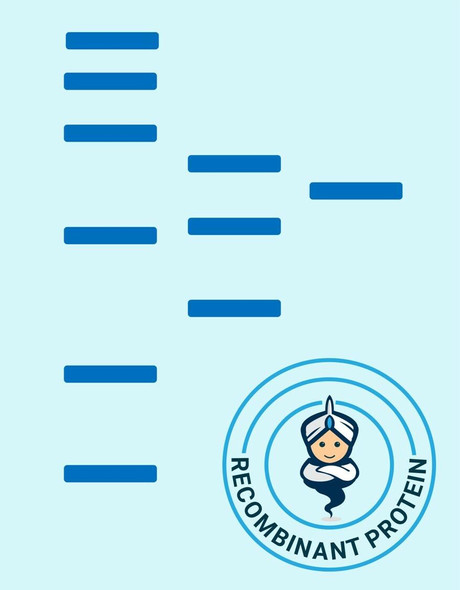Cytokines Recombinant Proteins
Human GDF5 Recombinant Protein (RPPB0304)
- SKU:
- RPPB0304
- Product Type:
- Recombinant Protein
- Species:
- Human
- Uniprot:
- P43026
- Research Area:
- Cytokines
Description
| Product Name: | Human GDF5 Recombinant Protein |
| Product Code: | RPPB0304 |
| Size: | 25µg |
| Species: | Human |
| Target: | GDF5 |
| Synonyms: | Cartilage-derived morphogenetic protein-1, CDMP-1, LAP4, SYNS2, GDF-5, Radotermin, CDMP1, GDF5, Growth differentiation factor 5, BMP-14. |
| Source: | Escherichia Coli |
| Physical Appearance: | Sterile Filtered colorless solution. |
| Formulation: | The GDF5 solution contains 10mM sodium citrate pH-3.5 and 10% glycerol. |
| Stability: | Store at 4°C if entire vial will be used within 2-4 weeks. Store, frozen at -20°C for longer periods of time. For long term storage it is recommended to add a carrier protein (0.1% HSA or BSA).Avoid multiple freeze-thaw cycles. |
| Purity: | Greater than 95.0% as determined by SDS-PAGE. |
| Amino Acid Sequence: | MGSSHHHHHH SSGLVPRGSH MAPLATRQGK RPSKNLKARC SRKALHVNFK DMGWDDWIIA PLEYEAFHCE GLCEFPLRSH LEPTNHAVIQ TLMNSMDPES TPPTCCVPTR LSPISILFID SANNVVYKQY EDMVVESCGC R |
GDF-5 is a member of the bone morphogenetic protein (BMP) family and the TGF-beta superfamily. This group of proteins is characterized by a polybasic proteolytic processing site which is cleaved to produce a mature protein containing seven conserved cysteine residues. The members of this family are regulators of cell growth and differentiation in both embryonic and adult tissues. Mutations in this gene are associated with acromesomelic dysplasia, Hunter-Thompson type; brachydactyly, type C; and chondrodysplasia, Grebe type. These associations confirm that the gene product plays a role in skeletal development.
GDF5 Human Recombinant produced in E.Coli is a single, non-glycosylated, polypeptide chain containing 141 amino acids (382-501 a.a.) and having a total molecular mass of 15.8 kDa. GDF5 is fused to a 20 amino acid His Tag at N-terminus and purified by proprietary chromatographic techniques.
| UniProt Protein Function: | GDF5: a cytokine that is a member of the bone morphogenetic protein (BMP) family and the TGF-beta superfamily. These cytokines are characterized by a polybasic proteolytic processing site which is cleaved to produce a mature protein containing seven conserved cysteine residues. The members of this family are regulators of cell growth and differentiation in both embryonic and adult tissues. Binds to bone morphogenetic protein receptors (BMPRs), a family of transmembrane serine/threonine kinases. BMPRs are involved in bone and cartilage formation. Chondrogenic signaling is mediated by the high-affinity receptor BMPR1B. Defects in GDF5 are the cause of acromesomelic chondrodysplasia Grebe type (AMDG), acromesomelic chondrodysplasia Hunter-Thompson type (AMDH), brachydactyly type C (BDC), Du Pan syndrome (DPS), symphalangism proximal syndrome (SYM1), multiple synostoses syndrome type 2 (SYNS2), and brachydactyly type A2 (BDA2). Genetic variations in GDF5 are associated with susceptibility to osteoarthritis type 5 (OS5). Belongs to the TGF-beta family. |
| UniProt Protein Details: | Protein type:Secreted, signal peptide; Secreted Chromosomal Location of Human Ortholog: 20q11.2 Cellular Component: extracellular space; extracellular region; plasma membrane Molecular Function:identical protein binding; protein binding; growth factor activity; cytokine activity; transforming growth factor beta receptor binding Biological Process: hindlimb morphogenesis; extracellular matrix organization and biogenesis; regulation of multicellular organism growth; regulation of apoptosis; forelimb morphogenesis; BMP signaling pathway; positive regulation of chondrocyte differentiation; cell-cell signaling; transforming growth factor beta receptor signaling pathway; regulation of MAPKKK cascade; chondrocyte differentiation; negative regulation of neuron apoptosis; positive regulation of neuron differentiation; cell development; negative regulation of epithelial cell proliferation; embryonic limb morphogenesis; growth Disease: Chondrodysplasia, Grebe Type; Acromesomelic Dysplasia, Hunter-thompson Type; Brachydactyly, Type A1, C; Brachydactyly, Type A2; Symphalangism, Proximal, 1b; Fibular Hypoplasia And Complex Brachydactyly; Brachydactyly, Type C; Osteoarthritis Susceptibility 5; Multiple Synostoses Syndrome 2 |
| NCBI Summary: | The protein encoded by this gene is a member of the bone morphogenetic protein (BMP) family and the TGF-beta superfamily. This group of proteins is characterized by a polybasic proteolytic processing site which is cleaved to produce a mature protein containing seven conserved cysteine residues. The members of this family are regulators of cell growth and differentiation in both embryonic and adult tissues. Mutations in this gene are associated with acromesomelic dysplasia, Hunter-Thompson type; brachydactyly, type C; and chondrodysplasia, Grebe type. These associations confirm that the gene product plays a role in skeletal development. [provided by RefSeq, Jul 2008] |
| UniProt Code: | P43026 |
| NCBI GenInfo Identifier: | 20141384 |
| NCBI Gene ID: | 8200 |
| NCBI Accession: | P43026.3 |
| UniProt Secondary Accession: | P43026,Q96SB1, E1P5Q2, |
| UniProt Related Accession: | P43026 |
| Molecular Weight: | Observed: 55kDaCalculated: 55kDa |
| NCBI Full Name: | Growth/differentiation factor 5 |
| NCBI Synonym Full Names: | growth differentiation factor 5 |
| NCBI Official Symbol: | GDF5�� |
| NCBI Official Synonym Symbols: | OS5; LAP4; BDA1C; BMP14; CDMP1; LAP-4; SYM1B; SYNS2; BMP-14�� |
| NCBI Protein Information: | growth/differentiation factor 5; CDMP-1; radotermin; LPS-associated protein 4; bone morphogenetic protein 14; lipopolysaccharide-associated protein 4; cartilage-derived morphogenetic protein-1 |
| UniProt Protein Name: | Growth/differentiation factor 5 |
| UniProt Synonym Protein Names: | Bone morphogenetic protein 14; BMP-14; Cartilage-derived morphogenetic protein 1; CDMP-1; Lipopolysaccharide-associated protein 4; LAP-4; LPS-associated protein 4; Radotermin |
| Protein Family: | Growth/differentiation factor |
| UniProt Gene Name: | GDF5�� |
| UniProt Entry Name: | GDF5_HUMAN |

